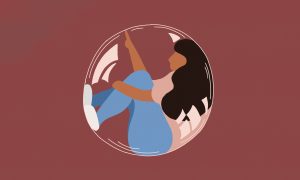Entering Georgetown, for any student, means saying goodbye to something. It might be your family, friends, hometown, or anything else, but regardless, it’s intimidating. It’s most people’s first experience living away from home—it’s a jarring transition that leaves you excited yet still shouldering a host of nerves. For me, I was most worried about the competitive environment. As a first-generation low-income (FGLI) student from a noncompetitive public school, I worried about how I would fare at an elite institution like Georgetown.
I had expected to feel like a small fish in a big pond—my high school GPA made my guidance counselor wince when I told him I was applying to Georgetown—but after hearing about my peers’ accolades, I felt like I was tossed aimlessly into the Pacific. I wasn’t just surrounded by valedictorians, but people who had already published research, interned on Wall Street, and amassed over 500 LinkedIn connections.
Regardless of the difference between our achievements, their academic and professional prowess motivated me. As it turned out, determination couldn’t solve everything. I hadn’t expected all A’s, yet my first few grades fell below my expectations. Where I normally would ask my classmates for help, I hesitated out of fear of looking asinine. This fear especially affected me in my business courses due to the hypercompetitive attitudes of my peers. When I would open up to people about my struggles, I would hear a phrase I became all too familiar with: “But isn’t that class easy?” I tried not to let that get me down.
I turned to club applications, but after a handful of Google Forms, three interviews, and no congratulatory emails, I felt like I had missed my last shot at belonging. I started to believe that maybe I wasn’t meant to succeed like everyone else at Georgetown. I recalled the speeches given at convocation—words telling us we would do great things and that we deserved to be here. Maybe those words were only pertinent to some—those who never felt they could achieve anything less than greatness. Maybe some individuals were just here to stand aside so others could shine brighter.
For a while I resigned myself to that fate at Georgetown. In the clubs I was later accepted into, I took on a quieter role. I listened in on meetings and simply worked in the background. People started to view me as “reserved,” and while not a bad trait, it didn’t feel like me. Rather than excelling at Georgetown like I had dreamed, I resorted to just trying to get by, trying to hide the fact I always felt like the least qualified person in the room. I spoke to my hometown friends about this realization, at which point I understood that this wasn’t how I wanted to be known as at Georgetown. I wanted to take up space, so I reckoned with my case of imposter syndrome and began seeking new avenues for community and self-expression.
One of the first places in which I found a new sense of community was with the Georgetown Scholars Program (GSP), a support program for selected FGLI students. Providing guidance, mentorship, and a sense of belonging, GSP events helped me get on my feet at Georgetown. In particular, the course offered to GSP students—Mastering the Hidden Curriculum—helped me grow confident in my place at an elite university. It was also here where I met other GSPers who were in the same situation as me. Being around individuals that could relate to the dilemmas I faced helped ground me, especially during my first semester. I was able to slow down and realize what an amazing community I was a part of, and that I too had something to offer Georgetown.
With my newfound confidence, I started to look for other places I could get involved at Georgetown. I became a Muslim Life Fellow for Campus Ministry, where I helped plan and manage events for the Muslim community here on campus. At this position, I learned that I loved managing logistics and event-planning for programs, skills that I further explored as Director of Programming for the Muslim Student Association. Now, I currently serve as the Programming Operations Coordinator for GSP, coming full circle to the organization that helped me find my footing at Georgetown. While I wasn’t capable of crushing consulting case interviews, I found a love of something new, which I never would have known if I let my failures stop me from applying myself.
While no class, social event, or conversation can solve all the symptoms of imposter syndrome, they can help you realize the contributions you make to Georgetown by just being here—by being yourself here. I understand that Georgetown makes it hard to feel that way. Even the framework I developed in Mastering the Hidden Curriculum seemed to quickly fade. Yet, at some point between your application, acceptance, and commitment, a part of you believed that you could be a Georgetown student. Georgetown saw that too.
The moments where you wonder if you should be here are inevitable and near-universal. But just as you forged your path to get here, you’ll need to do the same on the Hilltop. The only way to do that is to bring your identity to the forefront of all you do and have confidence in your abilities. Admittedly, even as a junior, I struggle to do that. Still, I have become more assured in my capabilities as a student, a leader, and a Hoya—and I’ll keep doing so. The FGLI experience at Georgetown will be different for every person who walks through the front gates, but we can all be united with our drive to succeed and our resourcefulness to make that success possible.







